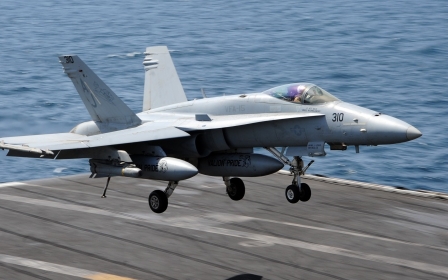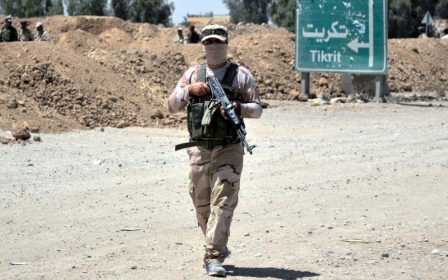Iraq FM hails Iran role in anti-IS fight in Kurdistan

Iraq's foreign minister hailed on Wednesday the role played by Iran in the fight against the Islamic State (IS) group, which Kurdish officials said has been actively taking part in the battles and still maintains a force on Iraqi territory.
"Iran has provided assistance to Iraq, as have some other countries. This is not a secret and we have to thank them for it," Ibrahim al-Jaafari told a news conference.
When asked about a comment in which the commander of Iran's ground forces last week vowed to protect his own border "deep into Iraqi territory" if necessary, Jaafari said Iranian support was welcome.
He said that foreign assistance should respect the country's sovereignty.
"We cannot accept that Iraq is becoming a land of conflict but we have to solve this problem in a way that preserves Iraqi sovereignty."
Meanwhile, retired US general John Allen, who is leading the international effort against IS, said Wednesday that the United States encourages any "helpful" role by the Iranians in tackling IS fighters.
"We're not going to contemplate a bilateral coalition with Iran," he said, but went on to add that the Iranians "have a role to play, and where that role is helpful, we'll encourage it."
Iran has been a close ally of Iraq's Shiite-dominated government, and Jaafari spent a whole decade in exile there when Baghdad was under Saddam Hussein's rule.
Critics have questioned the legal basis and motives for Iran's participation in the government's military efforts.
Iranian military unit in Iraq's Kurdistan
Iranian troops have been posted on the Iraqi side of the border in the south of Kurdistan while Tehran is also reported to play a key role in training and running some of Iraq's Shiite militias.
Kurdish officials said there were about 100 Iranian troops posted in the Khanaqin area, some 150 kilometres (95 miles) northeast of Baghdad.
"The centre of Khanaqin is only five kilometres away from Iran, it's as if it was in Iran," said General Jaafar Sheikh Mustafa, the Kurdistan Democratic Party's local leader.
"There are oil wells there that are very important and Iran has to defend itself, that's why they have sent a military unit, the Sabai Pasdaran Khorasan," he told AFP.
"In the Khanaqin region, the Sabai Pasdaran Khorasan, the Iraqi forces and the peshmerga fought together in the battle for Jalawla," he said.
Jalawla, which has been one of the main flashpoints in Iraq since the Islamic State group launched a devastating offensive in Iraq four months ago, lies just 30 kilometres from the border.
Mustafa said 600 Iranian troops moved across the border in June and July.
Iranian mortar specialists
"There are only 100 of them left to keep an eye on the situation, most of them mortar specialists," the general said.
The Patriotic Union of Kurdistan, the other historical party in the autonomous region, has had close ties with Iran over the years.
Iran "plays a very important role in the Middle East, especially in Iraq. If Iran is active in the Iraqi conflict, it will be easier to solve," Kurdish peshmerga forces spokesman Halgord Hekmat said.
"The Iranians were in Amerli," he said of a Turkmen Shiite town that the militants besieged for more than two months.
A joint push also involving the peshmerga, federal forces and Shiite militias broke the siege in late August, one of the biggest victories for Baghdad since the June debacle.
Hekmat said Iranian forces had also been deployed in Makhmur, about 60 kilometres southeast of Arbil, "to provide assistance, just in case".
New MEE newsletter: Jerusalem Dispatch
Sign up to get the latest insights and analysis on Israel-Palestine, alongside Turkey Unpacked and other MEE newsletters
Middle East Eye delivers independent and unrivalled coverage and analysis of the Middle East, North Africa and beyond. To learn more about republishing this content and the associated fees, please fill out this form. More about MEE can be found here.




